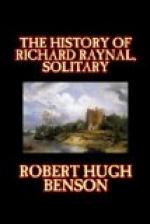On either side of the hut stood a great may-tree; it was on account of these that he had built his little house here, for he knew the properties and divine significations of such things.
The house itself was of wattles, plastered with mud from the brook, and thatched with straw. There was a door of wood that he leaned against the opening on this side when he prayed, but not when he slept, and a little square window high up upon the other side that looked into the green wood. It is of that same door that saint Giles’ new altar was made, for the house fell down after his going, and the wind blew about the mud and the sticks, and the pilgrims have now carried all away. I took the door myself, when I came back and had seen him go through the heavenly door to our Lord.
The house within was a circle, three strides across, with a domed roof like a bee-hive as high as a man at the sides and half as high again in the centre. On the left lay his straw for a bed, and above it on the wall the little square of linen that he took afterwards with him to London, worked with the five precious wounds of our Saviour. On the right hand side was a wooden stool where he sat sometimes to pray and on the wall against it a little press that held some bottles within, and in another shelf some holy relics that are now in the church, and in another his six books; and above, upon the top, a little cross with our Lord upon it, very rude; for he said that the eyes of the soul should not be hindered by the eyes of the body, and that our Lord showed Himself often to him more clearly and truly than a craftsman could make Him. Above the window was a little figure of the Mother of God, set there, he told me, above the sight of the green wood, because she was the mother of all living, and had restored what Eve had spoiled.
I cannot tell you, my children, of the peace of this place. The little house, and indeed the whole circle of the meadow set about with trees, was always to me as a mansion in paradise. There were no sounds here but the song of the birds and the running of the water and the wind in the trees; and no sight of any other world but this, except in winter when the hill over against the hut showed itself through the branches not three hundred paces away. On all other sides the woods rose to the sky. I think that the beasts knew the peace of the place. I have seen often a stag unafraid watching Master Richard as he dug or walked on his path; the robins would follow him, and the little furry creatures sit round him with ears on end. And he told me, too, that never since he had come to the place had blood fallen on the ground except his own when he scourged himself. The hunting-weasel never came here, though the conies were abundant; the stags never fought here though there was a fair ground for a battlefield. It was a peace that passed understanding, and what that peace is the apostle tells us.
Here I came then on Corpus Christi evening, thirty years ago, as the sun was near its setting behind the gate through which I came, and my shadow lay half-across the meadow before me.




